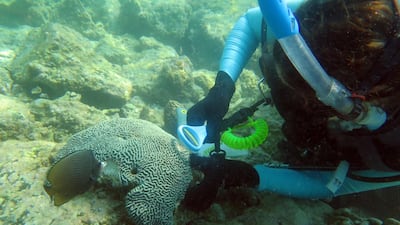While the effects of global warming on the polar ice sheets have been widely debated, closer to home, coral reefs are likely to be affected by rising temperatures too.
New York University Abu Dhabi researcher Dr Emily Howells wants to understand how these beautiful but delicate organisms respond to heat. And the results of her work could indicate how corals will react if, as expected, temperatures rise several degrees Celsius over the coming century.
Corals are already suffering badly as a result of climate change through “bleaching” and widespread dying off during hot summers, and the consequences for wider marine ecosystems around the world are severe. Corals provide food and places to live for fish and hundreds of other marine organisms - creatures that would suffer if corals die.
“You need living coral habitats to support the whole ecosystem,” said Dr Howells.
In her new study, Dr Howells, who cut her teeth as a marine biologist studying corals off her native Australia, will look at whether corals reared in warmer environments are better able to tolerate high temperatures than those of the same species grown in cooler conditions.
Previous work by Dr Howells, carried out with researchers at Zayed University in Abu Dhabi and Oregon State University in the United States, demonstrated that corals have adapted genetically to warmer conditions. This was indicated by there being genetic differences between corals living off Abu Dhabi’s Saadiyat Island (in the very warm Arabian Gulf) and corals off Fujairah (in the slightly milder Gulf of Oman).
The latest study will look at whether, on top of this ability to evolve to cope with higher temperatures, corals can adapt physiologically during their lifetime to warmer conditions.
“We’ll probably look at some that come from the Arabian Gulf and some from outside and [analyse] how their heat tolerance is affected by growing them up in different environments,” said Dr Howells.
“The corals here are already living under conditions we’re not expecting to see on reefs in other parts of the world for another 100 years.”
Coral reefs are formed from secreted skeletons of invertebrate organisms that belong to Phylum Cnidaria, a grouping that also includes jellyfish and anemones and which is one of the more than 30 phyla that make up Kingdom Animalia.
Corals are especially interesting biologically because they contain photosynthetic algae with which they live in a symbiotic, or mutually beneficial, relationship: the corals provide nutrients and protection, while the algae produce sugars, protein building blocks and oxygen. The earlier study showed that both the coral and the algae adapt genetically to warmer conditions.
Compared to some other parts of the world, Gulf coral reefs tend to have fewer species: on a dive in the Great Barrier Reef, as many as 50 or 100 species can be identified, while here the figure is typically 10 or less. Those species that are found in the Gulf must be tolerant of hot summers, cool winters and high salt levels.
Over the past three years, when she has been based in Abu Dhabi, Dr Howells has made 20 or so diving trips off Saadiyat Island and around half as many off Fujairah to study the health of the reef or collect small amounts of coral for her experiments. In both areas, the coral is usually around four to seven metres below the surface, so scuba-diving equipment is needed, although off parts of Fujairah there is coral that can be seen using just a snorkel.
In the forthcoming study, which is financed by the AXA Research Fund, Dr Howells will collect small coral samples and breed them in the laboratory.
Arabian Gulf corals breed annually around April time, releasing eggs and sperm into the water. In the laboratory, breeding will take place at the same time and will generate thousands of individuals for experiments.
Some of these will be exposed, as larvae, juveniles or adults, to a hot environment, while others will be grown in milder conditions. These siblings will then be compared with one another for their heat tolerance.
“If they perform in the same way, the environment didn’t have an effect; it’s down to their genetics,” said Dr Howells.
“But if we see a difference between those grown in the hot environment and those grown up in the cooler environment, then we can see that the corals can also acclimatise.”
Water temperatures in the Arabian Gulf can reach as high as 36C during the summer but because this would kill most young corals, in the forthcoming experiments the hotter conditions will be at about 33C and the milder conditions at about 27C.
“We’ll make thousands of babies and ... test some fairly early on in life, within just a week. Then we will leave others to grow up in these different environments for months,” said Dr Howells.
The first results should be available less than a year from now, although it will probably take about two years for the full picture to emerge.
The ideal result would be that corals grown in warmer environments do turn out to be more tolerant of higher temperatures later in life, as this would suggest that corals have a better chance of coping with the temperature changes that global warming will bring.
“If the environment is important, that should be good news. If we find there’s little difference with the environment, it’s probably going to take corals much longer to respond to rising temperatures, because [genetic] adaptation is a much slower process − it requires natural selection for heat-tolerant genotypes within the population,” said Dr Howells.
Also, if corals grown in warmer conditions are more resistant to heat, it will indicate that coral nurseries that grow the creatures to restore reefs could expose the corals to higher temperatures to make them better able to cope in warm seas.
newsdesk@thenational.ae
Daniel Bardsley is a UK-based freelance journalist and former reporter at The National.


